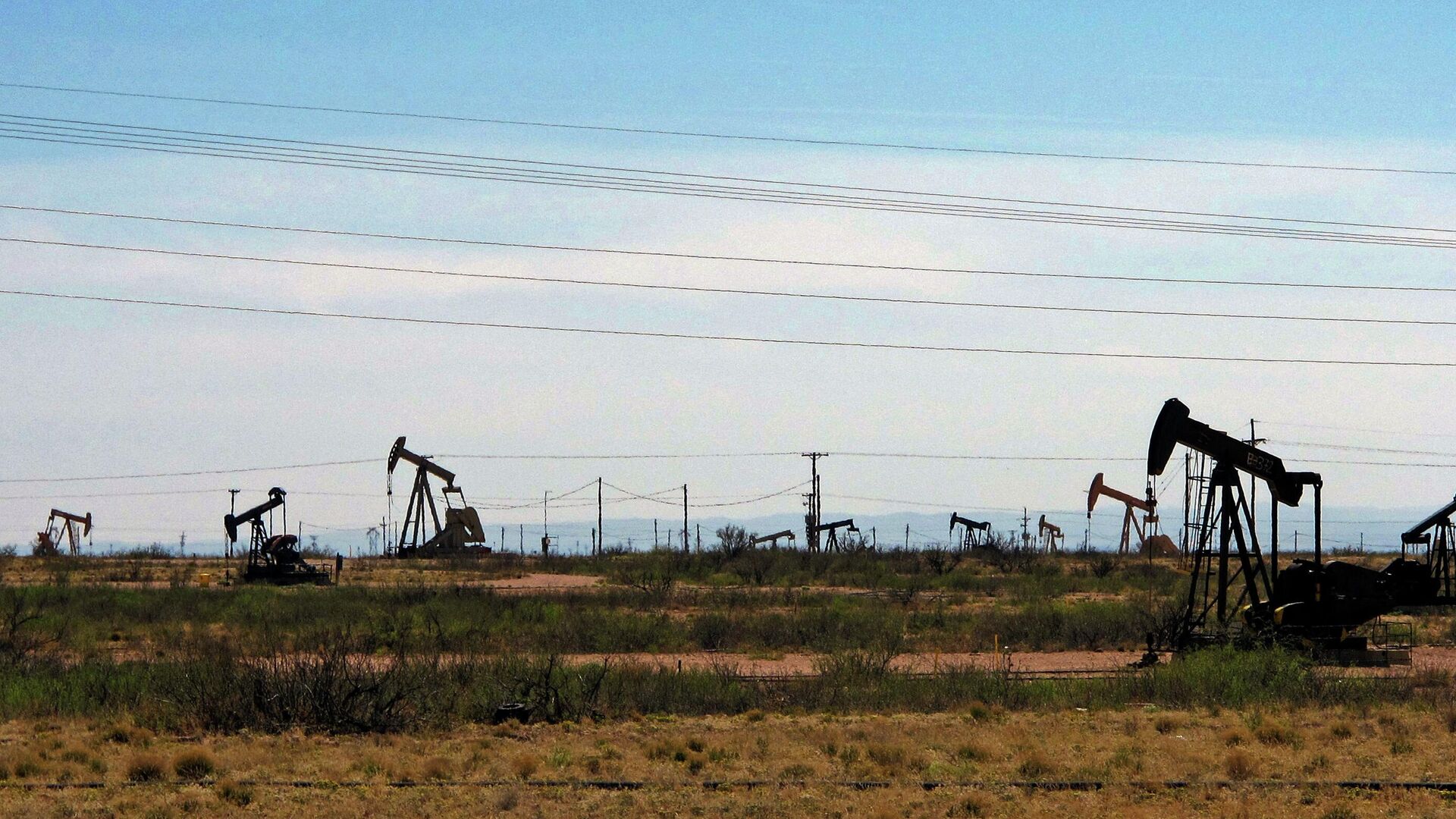https://sputnikglobe.com/20220629/oil-prices-up-another-2-on-signs-uae-saudi-arabia-have-maxed-out-production-1096772751.html
Oil Prices Up Another 2% on Signs UAE, Saudi Arabia Have Maxed Out Production
Oil Prices Up Another 2% on Signs UAE, Saudi Arabia Have Maxed Out Production
Sputnik International
NEW YORK (Sputnik) - Oil prices rose 2% on Tuesday, settling up a third straight day on talk that the United Arab Emirates (UAE) were closing to maxing out... 29.06.2022, Sputnik International
2022-06-29T00:55+0000
2022-06-29T00:55+0000
2022-06-29T00:55+0000
opec
oil
oil prices
https://cdn1.img.sputnikglobe.com/img/07e6/05/10/1095554781_45:0:2841:1573_1920x0_80_0_0_c6379d9b000b1d2104a38b74be85db40.jpg
New York-traded West Texas Intermediate (WTI) the benchmark for US crude, settled up $2.19, or 2%, at $111.76 per barrel.London-traded Brent crude, the global benchmark for oil, settled up $2.89, or 2.5%, at $117.98.WTI has rebounded about 7% while Brent has gained about 3% since their last negative settlement on Thursday. Prior to that, the two benchmarks lost as much as 14% in a near two-week long slump that proved to be crude’s worst selloff in two months.The rumblings of undersupply in oil versus the whispers of recession - that triggered the selloff of the past two weeks - have led to volatile moves in WTI and Brent of late.Adding to oil’s bull narrative on Tuesday was the easing of China's zero-COVID-19 policy. As the world’s biggest oil importer, Beijing’s tough stance on the pandemic - even after most of the world had moved on from imposing social, business and travel restrictions related to the virus - has held crude prices from achieving their true bullish potential this year, analysts say.Also aiding this week’s rebound in oil was data showing that countries in the OPEC+ alliance of oil producers were together producing around 2.7 million barrels per day less than prescribed by the group.At the current pace of OPEC+ production, "even sanctions being lifted on Iran and Venezuela can't do much against that backdrop," Craig Erlam, analyst at online trading platform OANDA, said.The lifting of sanctions imposed on Venezuela and Iran by his predecessor Donald Trump are among the options being considered by US President Joe Biden to increase the global supply of oil, which has been precariously low since the outbreak of the Ukraine conflict and its own attendant sanctions on major crude exporter Russia.Since Friday though, the move has been decidedly positive, with sentiment accelerating on Monday after French President Emmanuel Macron went on record with details of his telephone call with his UAE counterpart Mohammed bin Zayed Al Nahyan, who apparently told him the UAE could not do much more with production that what they were already managing.Macron also noted that bin Zayed told him Saudi Arabia can increase a little bit, about 150,000 barrels a day or a little more," the French president said, adding: "They don’t have huge capacities".UAE Energy Minister Suhail Al Mazroui Al Mazrouei wrote on Twitter that the country was producing near to its maximum production capacity based on the current OPEC+ baseline" of 3.168 million barrels per day. The baseline - stipulated in a deal between the OPEC cartel and its allies - remains in effect until the end of the year, he said.
https://sputnikglobe.com/20220628/china-cuts-quarantine-time-for-foreign-visitors-in-first-change-since-march-2020-1096766511.html
https://sputnikglobe.com/20220628/sareful-maybe-we-should-go-inside-biden-aide-cuts-in-on-macron-discussing-oil-output-with-potus-1096750751.html
Sputnik International
feedback@sputniknews.com
+74956456601
MIA „Rosiya Segodnya“
2022
Sputnik International
feedback@sputniknews.com
+74956456601
MIA „Rosiya Segodnya“
News
en_EN
Sputnik International
feedback@sputniknews.com
+74956456601
MIA „Rosiya Segodnya“
Sputnik International
feedback@sputniknews.com
+74956456601
MIA „Rosiya Segodnya“
opec, oil, oil prices
Oil Prices Up Another 2% on Signs UAE, Saudi Arabia Have Maxed Out Production
NEW YORK (Sputnik) - Oil prices rose 2% on Tuesday, settling up a third straight day on talk that the United Arab Emirates (UAE) were closing to maxing out their oil production, defying the belief that they had adequate capacity to raise output in the event of a major emergency.
New York-traded West Texas Intermediate (WTI) the benchmark for US crude, settled up $2.19, or 2%, at $111.76 per barrel.
London-traded Brent crude, the global benchmark for oil, settled up $2.89, or 2.5%, at $117.98.
WTI has rebounded about 7% while Brent has gained about 3% since their last negative settlement on Thursday. Prior to that, the two benchmarks lost as much as 14% in a near two-week long slump that proved to be crude’s worst selloff in two months.
The rumblings of undersupply in oil versus the whispers of recession - that triggered the selloff of the past two weeks - have led to volatile moves in WTI and Brent of late.
Adding to oil’s bull narrative on Tuesday was the easing of China's zero-COVID-19 policy. As the world’s biggest oil importer, Beijing’s tough stance on the pandemic - even after most of the world had moved on from imposing social, business and travel restrictions related to the virus - has held crude prices from achieving their true bullish potential this year, analysts say.
Also aiding this week’s rebound in oil was data showing that countries in the OPEC+ alliance of oil producers were together producing around 2.7 million barrels per day less than prescribed by the group.
At the current pace of OPEC+ production, "even sanctions being lifted on Iran and Venezuela can't do much against that backdrop," Craig Erlam, analyst at online trading platform OANDA, said.
The lifting of sanctions imposed on Venezuela and Iran by his predecessor Donald Trump are among the options being considered by US President Joe Biden to increase the global supply of oil, which has been precariously low since the outbreak of the Ukraine conflict and its own attendant sanctions on major crude exporter Russia.
Since Friday though, the move has been decidedly positive, with sentiment accelerating on Monday after French President Emmanuel Macron went on record with details of his telephone call with his UAE counterpart Mohammed bin Zayed Al Nahyan, who apparently told him the UAE could not do much more with production that what they were already managing.
Macron also noted that bin Zayed told him Saudi Arabia can increase a little bit, about 150,000 barrels a day or a little more," the French president said, adding: "They don’t have huge capacities".
UAE Energy Minister Suhail Al Mazroui Al Mazrouei wrote on Twitter that the country was producing near to its maximum production capacity based on the current OPEC+ baseline" of 3.168 million barrels per day. The baseline - stipulated in a deal between the OPEC cartel and its allies - remains in effect until the end of the year, he said.





